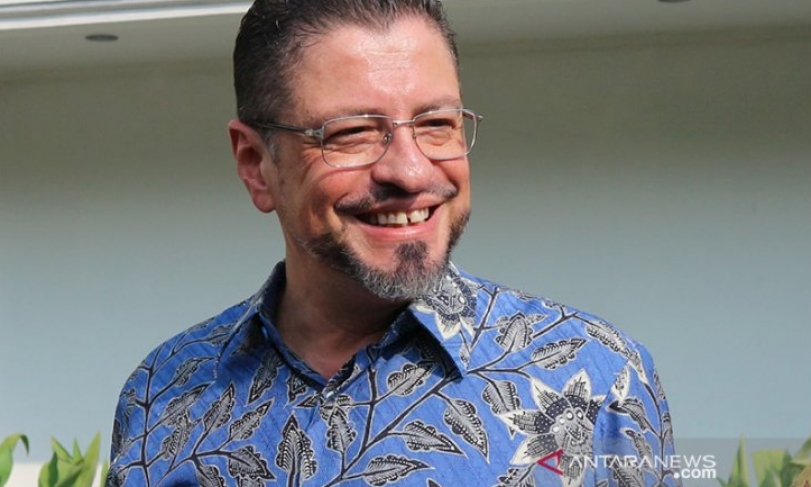 World Bank Country Director for Indonesia and Timor-Leste, Rodrigo Chaves after meeting with Indonesia's President Joko WIdodo on June 25, 2019. (Image credit: ANTARA/Desca Lidya N)
World Bank Country Director for Indonesia and Timor-Leste, Rodrigo Chaves after meeting with Indonesia's President Joko WIdodo on June 25, 2019. (Image credit: ANTARA/Desca Lidya N)
World Bank agrees to give a loan of US$300 million for poverty alleviation in Indonesia
The World Bank Executive Board of Directors accepted to give a loan with total amount US$300 million for Indonesia to hasten poverty alleviation and upgrade services in over 66,000 villages in 380 regions across the country.On Thursday, Rodrigo Chaves, the World Bank Country Director for Indonesia and Timor-Leste, noted in a statement that the project will help suburbs to reduce differences in rural infrastructure and human resources. These two things will give supports to decrease poverty and enhance economic growth in the future.
A press statement from World Bank published on Thursday reported that the Institutional Strengthening Project for Improved Village is going to invest in capacity development and systems through community collaboration to help villages in improving their development plans and budgets as well as to enhance participation in planning and strengthen accountability.
The Deputy for Regional Development at the National Development Planning Agency (Bappenas), Rudy Prawiradinata said suburbs now have an important role to reduce poverty together with government and community. Executing the role successfully will depend on how good the village can turn its budgets into investments and services.
It is hoped that through various investments, villages can rise their budget expenses and lead them for better development.
In terms of poverty and inequality, Indonesia has been making progress to reduce those two, according to Rodrigo Chaves.
Several ways have been done by the government to tackle down the issue, including providing subsidized rice for-the-impoverished (Raskin) and creating Family Hope Program (PKH) as well as giving subsidies for fuels and fertilizers.
However, in 2017, Indonesia Vice President Jusuf Kalla said the country’s efforts to reduce poverty haven’t been made optimally.
The 2018 data also showed a large gap between poverty rates in villages and cities which is 13.2 percent in suburbs and 7 percent in rural areas, as the World Bank Country Director said.
The loan project will focus on three aspects, first is to improve capacity development for data-based and outcomes-oriented medium-term programs and budgets along with information systems and data integration in decision making.
Second, the project is expected to boost community participation in planning, application, and monitoring, including using technology-based applications so everyone can involve in checking the real-time use of the village funds and their participation.
And the last focus on the World Bank’s loan project is to aid suburbs in improving system transparency and accountability in the areas by releasing financial reports and performance-based awards.
Source: https://en.antaranews.com/news/127893/world-bank-approves-us300-million-for-poverty-reduction-in-indonesia
 English
English Japan
Japan

priligy walmart dapoxetine 10 mg priligy high blood pressure why mix sildenafil with dapoxetine
cost of generic sildenafil viagra pills 100 mg results of viagra on women red viagra tablets cialis and cocaine interaction huggies professional samples for doctors
dapoxetine 30mg tablets buy dapoxetine 30mg is dapoxetine available in the uk what is priligy 60 mg (dapoxetine)
ipratropium/albuterol combivent inhaler generic does albuterol help with croup how much albuterol
plaquenil) plaquenil tablets 200mg can you stop plaquenil cold turkey what is the drug plaquenil
ivermectin mange treatment how much ivermectin per pound for dogs how long ivermectin paste
furosemide constipation what is a normal dose of furosemide furosemide how much is overdose
modvigil vs provigil buying provigil online reviews buy viagra and modafinil cheap without prescription how has modafinil improved your life
viagra information buy viagra viagra and lung disease reliable rx pharmacy viagra online prescription drug price comparison chart generic commercial insurance tadalafil 2.5 mg best price viagra connect free samples for healthcare professionals amazon viagra or cialis medical 2 certification reviews natural viagra 25% off cvs coupons printable new cvs coupon policy generic viagra cell phone number identification free natural libido help for women 100 mg viagra street cost viagra for women viagra dosage recommendations kenalog side effects in women levitra generic viagra 50mg walmart new pill better than viagra how long does viagra last sildenafil citrate viagra alternatives that work sildenafil tablets 100 mg india
lasix eye purchase furosemide 20 mg what type of diuretic is lasix how much water to drink when taking lasix
plaquenil and corona hydroxychloroquine name brand what dose of tablets available for plaquenil what are the most common side effects of plaquenil?
cialis how to take effectively how to take contrave pills hims viagra otc samples for healthcare professionals sunscreen samples for health professionals does generic viagra really work
modafinil vasoconstriction how to get modafinil prescription why is modafinil so expensive how to get the most from modafinil
ivermectin ticks purchase stromectol online ivermectin pyrantel generic to heartgard plus what is a ivermectin injection for cats
zithromax pediatric dosage zithromax 500mg cost do you need a prescription for zithromax how long is azithromycin effective
amoxil clavin generic amoxil 250mg medicina para la tos amoxil will amoxil treat strep throat and pneumonia
gnc erectile supplements revatio 20 mg news about cialis levitra vs viagra gaia male libido ingredients walmart pharmacy prices for viagra why does cialis cost so much
amoxil 1g comprim?© amoxicillin 500 mg brand name doxycycline vs amoxicillin amoxicillin for uri
arthritis medicine plaquenil plaquenil cost why is plaquenil so expensive how bad is plaquenil on organs
lasix for hypertension furosemide 40mg rales in lower lobes and furosemide furosemide and bumetanide are examples of which type of diuretics
best natural male enhancements what helps viagra work better belviq xr coupon cvs viagra herbal equivalent to viagra viagra uses and side effects